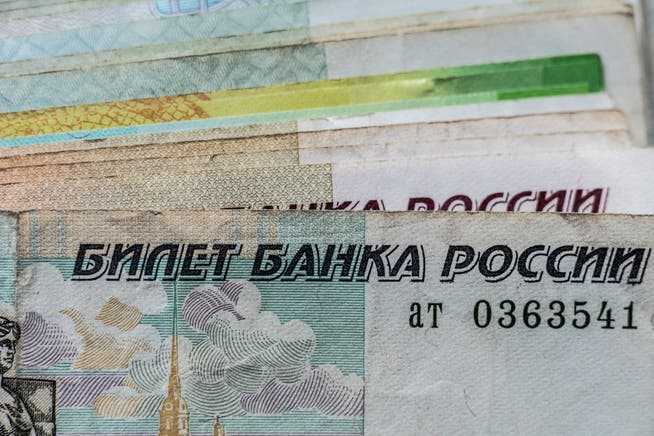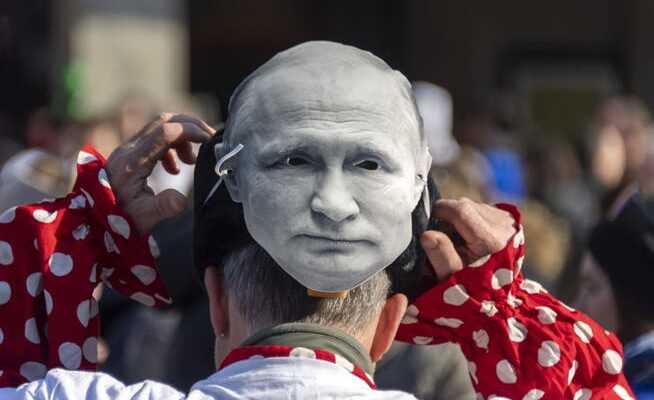Russia has reacted to the sanctions and in turn wants to punish Western countries. However, the companies affected by the Russian act can defend themselves.
Vladimir Putin does not like the sanctions and criticism from Western countries. He responds with a sanctions list.
Especially in war, a lot is a question of perspective. This was blatantly demonstrated after Russia’s attack on Ukraine. From the point of view of the Western world, Russia is the aggressor that disregards Ukraine’s statehood. Chancellor Olaf Scholz called the actions of Kremlin chief Vladimir Putin an “infamous breach of international law”.
It is now clear how the other side will react to the sanctions imposed. On Monday, Russia released the names of 48 countries and regions it considers “unfriendly to the Russian Federation, its businesses and its people.” The Russian legal basis for this is the Presidential Decree on the “Temporary Regime on Fulfillment of Obligations to Some Foreign Creditors”.
According to Andreas Heller, spokesman for the Federal Department of Foreign Affairs (FDFA), Switzerland was not officially informed of the move by Russia, but only found out about the list from the media. The FDFA assumes that the direct effects of this decision are currently concentrated on financial transactions with companies from these countries.
Правительство утвердило перечень недружественных России стран. If it isn’t, because of what is said:
Австралия, Великобритания, страны ЕС, Исландия, Канада, Лихтенштейн, Монако, Новая Зеландия, Норвегия, Корея, Сан-Марино, Сингапур, США, Тайвань, Украина, Черногория, Швейцария, Япония
— РИА Новости (@rianru) March 7, 2022
“Affront to the States mentioned”
In fact, the entire western world, including Switzerland and Germany, is branded with this act. But what exactly does this declaration of unfriendliness mean? According to this counter-sanction, Russian citizens, companies, the state itself or even municipalities may only pay obligations in other currencies in rubles. In addition, the states would have to set up a clearing account with a Russian bank, the Russian side said.
“The term ‘unfriendly states’ is not a term determined by international law,” explains Helen Keller, Professor of International Law, European Law and Public Law at the University of Zurich. There is, however, the expression “unfriendly act”. This refers to state behavior that causes disadvantages to another state or expresses disregard for it without this representing a breach of international law. “The list published by President Putin can be understood as such an affront to the states mentioned,” says Keller.
“Russia has every right to divide the world into more or less sympathetic countries,” says Michael Hahn, director of the Institute for European and International Economic Law at the University of Bern. “But Russia is not free to violate international law. The categorization as an ‹unfriendly state› does not entitle you to act in violation of international law.”
Hahn also puts a question mark over whether the threatened payment was only legal in rubles. “Insofar as the contracts between Western companies and Russian companies and institutions stipulate the currency in which the goods or services must be paid for, it is not permissible to deviate from this without further ado.”
However, difficulties are to be expected for some companies. Because even if a lawsuit were successful before a competent non-Russian court, there is still no guarantee that the outstanding claims would actually be settled, says Hahn. Then begin the hunt for assets.

In the future, companies from many Western countries will only be able to pay in rubles in Russia.
In terms of international law, according to Keller, an unfriendly act entitles the target state to a so-called retaliation, i.e. to an unfriendly but international law action as a reaction to the unfriendly act. “Beyond that, the legal relationships under international law are not affected. It remains with actions below a violation of international law, which of course impair diplomatic relations,” emphasizes Keller.
From the point of view of the international law expert, the list issued by Russia does not have the same status as the lists issued by the EU and the OECD. A comparability exists at most insofar as both the EU and OECD lists as well as Putin’s list of unfriendly states set up additional hurdles for international trade. “The decisive difference, however, is the political direction,” emphasizes Keller. The OECD lists were about compliance with and implementation of EU tax policy goals. “With his list, President Putin wants to express a hostile attitude towards the countries on the list, especially in terms of foreign policy,” emphasizes Helen Keller.
punishment for sanctions
For Keller, the obvious conclusion is that Switzerland was included on this list because it fully supports the EU’s sanctions. “It can’t be proven. In any case, all states that have imposed sanctions against Russia are affected,” explains the international law expert.
As early as 2021, Russia put the USA and the Czech Republic on the list of “unfriendly countries”. As a result, the two countries were no longer allowed to employ Russian nationals as employees. So far, Switzerland has not drawn any conclusions. “The embassy staff in our representation was not reduced,” explains FDFA media spokesman Heller.
The move has sparked no publicly known reactions from the majority of the 48 states now declared unfriendly by Russia. An exception is Japan. There, the head of cabinet Hirokazu Matsuno said on Tuesday that the Japanese government had expressed its displeasure with Russia through diplomatic channels. “It is unfortunate that (Russia) has publicized an action that could have a negative impact on the Japanese public and their businesses,” Matsuno said at a news conference. According to EDA spokesman Heller, Switzerland will include the list of unfriendly states in talks with the Russian side.
